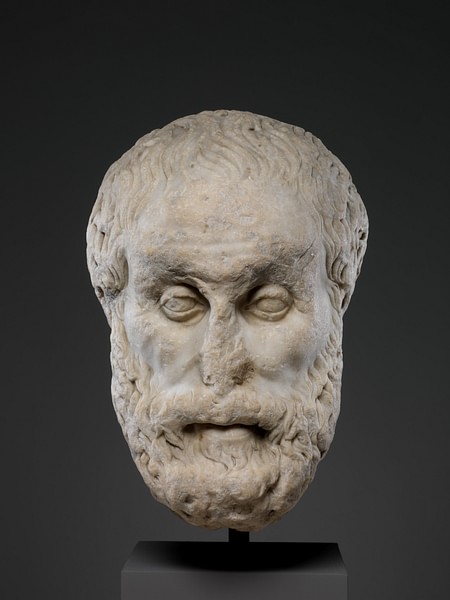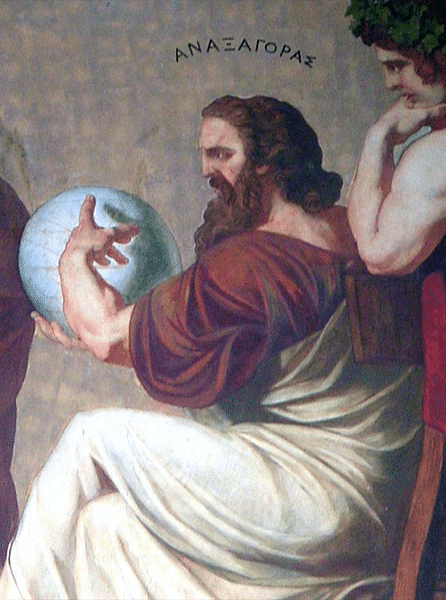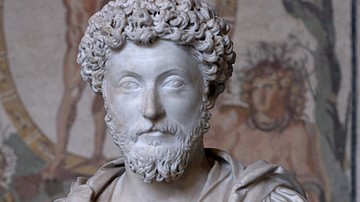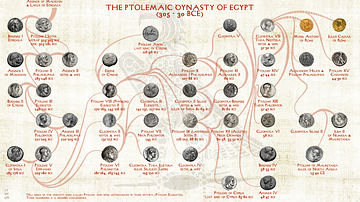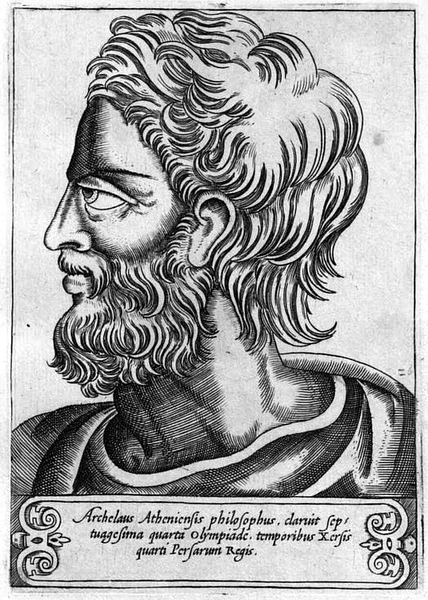
Archelaus of Athens (l. c. 5th century BCE) was a Pre-Socratic philosopher in ancient Greece who claimed the first cause of existence was the opposition of cold and heat which caused the separation of the universal essence to produce a plurality of living things. He is considered the last Pre-Socratic philosopher as he is claimed to have taught Socrates.
The modern-day term 'Pre-Socratic Philosophers' refers to the Greek thinkers who lived and wrote prior to Socrates of Athens (l. 470/469-399 BCE), beginning with Thales of Miletus (l. c. 585 BCE) and ending with Archelaus. It is unclear whether Archelaus actually was Socrates' teacher as he is never identified as such in the works of Plato (l. 424/423-348/347 BCE) or of Xenophon (l. 430 to c. 354 BCE), the two primary sources on Socrates, nor by Aristotle (l. 384-322 BCE) who wrote a summary of the Pre-Socratics and their contributions.
Whatever Archelaus wrote has been lost, and only one fragment is tentatively attributed to him. What is known of him comes from later writers such as Sextus Empiricus (l. c. 160 to c. 210 CE), Diogenes Laertius (l. c. 180-240 CE), Hippolytus of Rome (l. c. 170-c. 235 CE), Pseudo-Plutarch (wrote c. 3rd-4th century CE), and Simplicius of Cilicia (l. c. 490 to c. 560 CE), among others. Diogenes Laertius and Sextus Empiricus claim that Archelaus was more than just a 'natural philosopher' who investigated the cause of observable phenomena and also taught ethics. Laertius, in fact, claims that Socrates did not invent his ethical system but took it from Archelaus, though this has been challenged, like much of Laertius' work, as he never cites his sources and often presents hearsay as fact.
What is known of Archelaus' life and philosophy is that he was a student of Anaxagoras (l. c. 500 to c. 428 BCE) who developed his concept of a unified one that separated into many but rejected his teacher's claim of a universal mind that set all things in motion or, perhaps, included that claim in his system but in modified form. He may have also developed an ethical system, but as noted, this is unclear. Although understood as the last of the Pre-Socratics, he is often omitted from works on the subject because so little is known about him and those details come from much later, and sometimes unreliable, sources.
The Pre-Socratics & First Cause
Aristotle defined the Pre-Socratic philosophers by schools of thought, beginning with the Ionian School comprised of thinkers who lived and wrote in Ionia, the west coast of Asia Minor (present-day Turkey). The Ionian philosophers were:
- Thales of Miletus (l. c. 585 BCE)
- Anaximander (l. c. 610 to c. 546 BCE)
- Anaximenes (l. c. 546 BCE)
- Heraclitus of Ephesus (l. c. 500 BCE)
- Anaxagoras (l. c. 500 to c. 428 BCE)
- Archelaus (l. c. 5th century BCE)
Pythagoras (l. c. 571 to c. 497 BCE), though not included in Aristotle's list, was also an Ionian philosopher from the nearby island of Samos. These thinkers were considered by Aristotle as distinct from the Eleatic School (centered in Elea, southern Italy) whose best-known members were:
- Parmenides (l. c. 485 BCE)
- Zeno of Elea (l. c. 465 BCE)
- Melissus of Samos (l. c. 5th century BCE)
Xenophanes of Colophon (l. c. 570 to c. 478 BCE) is also sometimes considered an Eleatic and, according to some sources, was Parmenides' teacher and the founder of the Eleatic School. Empedocles (l. c. 484-c.424 BCE), who synthesized the Pre-Socratic systems from Thales through Zeno, is considered in a class of his own.
The primary focus of the Ionian School was defining the first cause of existence. Thales claimed it was water – the source of all life, which was an essential part of all creation – while Anaximander conceived of an eternal, changeless, and ever-creative force he called the apeiron that brought all into existence and maintained it. Anaximenes brought the first cause back to observable phenomena claiming it was air, which, through rarefaction and condensation, was the basic principle in all things. Heraclitus rejected all of these concepts and claimed that fire was the first cause and strife was the single constant in life. Through the striving of opposites with each other, life came to be and continued as this 'striving' produced change, and change was the very nature of existence, not an aspect of it, but existence itself.
Pythagoras objected to all of the above and claimed that number was the first cause. Number was not simply an expression of a given quantity but a representation of truth and actual reality in that it was limitless but provided observable limits in differentiating one from many, thereby pointing to rational progress from which what-is manifested. Xenophanes mocked Pythagoras and maintained that everything came from a single, all-powerful god, unlike humans in every way, who had created the world and established its order.
All of these claims were refuted by Parmenides (though he is closest to Xenophanes' vision), who claimed that all of reality was of a single, indestructible substance, which was uncreated and immobile. It had always existed and would always exist and, all things sharing in this substance, all things were equally immobile and, therefore, change was an illusion produced by sense perception. His claims were supported by Zeno of Elea through a series of logical paradoxes proving the impossibility of motion and change and were (possibly) enlarged upon by Melissus of Samos.
The philosophical progress of the Ionian School was stopped by Parmenides' claims because all their systems relied on the acceptance of the reality of change as part of existence. If there was no such thing as change, none of their systems worked, but on the simple practical level, one could not explain observable phenomena such as a person walking from Athens to Eleusis, if motion were really only an illusion.
Empedocles attempted to harmonize the Ionian and Eleatic schools through his system that claimed existence was defined by four unchanging root causes – earth, air, fire, and water – which were bound by the attraction of love and separated by the opposition of strife. He was thereby able to join the Eleatic model of an unchangeable reality with the Ionian view of constant change.
Anaxagoras' System
Anaxagoras is thought to have responded to Empedocles (though some claim it is the other way around) through his system that maintained that existence was one as it was comprised of indestructible, eternal 'seeds' which had once been part of a unified whole that was separated by Mind – a universal intelligence that brought many (observable phenomena) from one (undifferentiated mass). His foundational teaching was that "In everything, there is a portion of everything" (DK59B.11/Robinson 177). These 'seeds' – also understood as 'stuff' – which were unchangeable, came together in forms defined by how much of one type of 'stuff' was dominant. A dog, for example, was recognized as such because it had more 'dog stuff' constituting it than 'cat stuff', and if more 'cat stuff' was present in the form, it was understood to be a cat.
Once upon a time, this 'stuff' had all been of one, single, mass until Mind had introduced differentiation. Mind remained separate from the existence it had set in motion and did not mingle with it, remaining aloof once it had accomplished its goal. Anaxagoras writes:
Other things have a share of everything, but mind is infinite and self-ruled and not mixed with anything, but is alone by itself. For if it were not by itself, but were mixed with anything else, it would, by virtue of being mixed with this, have a share of all things; for there is a portion of everything in everything, as I have said before. And the things that were mixed in it would hinder it, so that it could control nothing as it does now, being alone by itself. For it is the finest of all things and the greatest power; and over everything that has soul, large or small, mind rules. (DK 59B.12/Robinson, 181)
The problem with this vision is that Anaxagoras never defines Mind, nor does he say how it 'rules' when it seems to remain 'unmixed' and 'aloof' from creation. It might be possible to suggest that he developed the concept more fully but that these passages have been lost, were it not for objections by both Plato and Aristotle to this very thing. In Plato's Phaedo, 97-98e, he has Socrates express his disappointment that Anaxagoras has introduced this intriguing concept of a universal mind but left it undeveloped.
Archelaus' Philosophy
Archelaus seems to have tried to resolve this problem by eliminating Mind from the system. Diogenes Laertius provides the following description of Archelaus' model of existence:
Archelaus laid down that there were two causes of growth or becoming, heat and cold; that living things were produced from slime; and that what is just and what is base depends not upon nature but upon convention. His theory is to this effect. Water is melted by heat and produces on the one hand, earth in so far as, by the action of fire, it sinks and coheres while, on the other hand, it generates air in so far as it overflows on all sides. Hence the earth is confined by the air and the air by the circumambient fire. Living things, he holds, are generated from the earth when it is heated and throws off slime of the consistency of milk to serve as a sort of nourishment, and in this same way the earth produced man. He was the first who explained sound as being the concussion of the air, and the formation of the sea in hollow places as due to its filtering through the earth. He declared the sun to be the largest of the heavenly bodies and the universe to be unlimited. (IV.16-17)
This passage is supported, in part, by Hippolytus:
On the topic of the animals, [Archelaus] says that when the earth first warmed up in the lower part, where the hot and cold were mixing, many other animals as well as humans beings appeared, all of which had the same regimen, given that they all were nourished by the mud. But they were short-lived. Later on, generation from one another was established. (T5/Hippolytus I.9.5)
The operation of heat and cold in opposition to each other caused thinning and then thickening of essential, unified matter, producing a milky mud, which, when it hardened with cold, created forms acted upon by heat and produced animals and humans who fed upon the milky substance they came from. It would appear, from the Hippolytus fragment, that the first of these died quickly, but as the process continued, creatures were able to sustain themselves long enough to reproduce, and after this, the observable process of reproduction continued.
Although some scholars have suggested that Archelaus retained Anaxagoras' universal mind, there is no extant fragment of his to support this nor does it seem suggested by later writers. The only extant fragment thought to be original to Archelaus is "The cold is a bond" (Freeman, 86/fragment Ia). This would be a reference to the cooling action of the opposites and the hardening of the milky substance to create the form of animals and humans.
Archelaus' philosophy, then, would seem to be completely mechanistic in that elements in opposition generate life with no higher power directing it and no moral or ethical facet, but this is contradicted by other passages from later writers who maintain that he taught an ethical system. Laertius notes:
Archelaus, the son of Apollodorus, or as some say of Midon, was a citizen of Athens or of Miletus; he was a pupil of Anaxagoras who first brought natural philosophy from Ionia to Athens. Archelaus was the teacher of Socrates. He was called the physicist inasmuch as with him natural philosophy came to an end, as soon as Socrates had introduced ethics. It would seem that Archelaus himself also treated of ethics, for he has discussed laws and goodness and justice; Socrates took the subject from him and, having improved it to the utmost, was regarded as its inventor. (IV.16)
Sextus Empiricus states that "Archelaus of Athens pursued the physical and ethical" aspects of philosophy (T4/Empiricus M7.14), and Hippolytus notes how Archelaus claims it was only after human creatures separated themselves from animal creatures that laws were required to regulate behavior, leaders had to be chosen, and communities (cities) were formed, suggesting the need for an ethical code to control people's impulses. Hippolytus' fragment supports Laertius' claim that Archelaus taught that "what is just and what is base depends not upon nature but upon convention" (IV.16) in that laws were created by humans, not derived from the natural world or a divine source.
What Archelaus' ethics consisted of is unknown and, although the other writers agree with Laertius that Archelaus was Socrates' teacher, Laertius is the only source to claim that Socrates 'took the subject' of ethics from him and improved on it. This seems unlikely if Archelaus claimed that concepts of 'justice' and 'injustice' ("what is just and what is base") were mere human constructs as this claim is refuted by Socrates in Plato's Republic Book I. The concept of 'justice' as a human construct is associated with sophists such as Thrasymachus (l. c. 459 to c. 400 BCE), Critias (l. c. 460-403 BCE), and Gorgias (l. c. 427 BCE), not with Socrates.
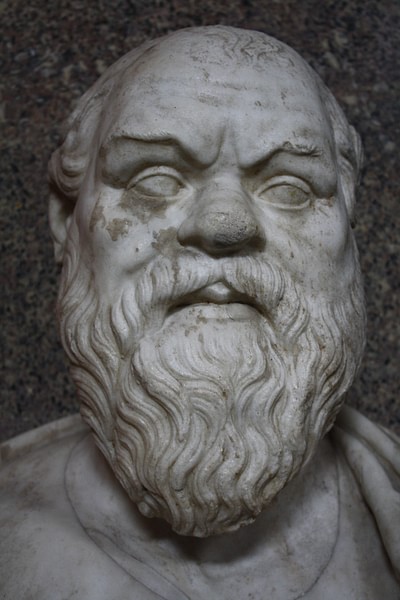
Claims that Archelaus was the philosophical genius behind Socrates' system of ethics lack any support from Plato, Xenophon, or Aristotle. There is no way of knowing, however, what they omitted from their narratives or, for that matter, whether it was Socrates or Plato who developed the ethical system since Socrates never wrote anything down and the most complete representation of the system attributed to him comes from Plato.
Conclusion
The systems and claims of a number of different Pre-Socratics seem to figure in Archelaus’ philosophy, notably Anaximander's apeiron and Anaximenes' air, though the most direct influence comes from Anaxagoras. How Archelaus developed these ideas, however, or what his fully developed system looked like, is impossible to know. The difficulty in interpreting any of the claims of the Pre-Socratic philosophers is the lack of complete works or, as in the case of Pythagoras, no works at all attributed to him, necessitating reliance on fragments cited by others after Philolaus. This problem is apparent in attempting to reconstruct Archelaus' philosophy more than his predecessors because even Anaximander, who is also claimed to have a single fragment attributed to him, was discussed in greater depth by later philosophers.
The most accurate terms that can be used in addressing Archelaus and his philosophy are speculative because, even though Hippolytus or Laertius or others addressed the topic, they were far removed from his time and were repeating claims from sources no longer extant and so impossible to judge in terms of accuracy. It would seem, if Archelaus really did suggest an ethical system to Socrates, to cite only one example, more would have been made of this by writers closer to that time, even if one recognizes that Plato, at least, would have been disinclined to suggest anything that might have detracted from Socrates' unique vision.
At the same time, it is possible that Archelaus did suggest some sort of system to Socrates or that his works developed Anaxagoras' claims more completely. One can always speculate on the possibilities of historical influences when there are few, or no, sources to support or contradict one's claims. The most accurate assessment of Archelaus' influence on Socrates and later philosophy is simply that it cannot be established through extant sources, and any claims about him must remain largely speculative in spite of the efforts of modern-day scholars to prove otherwise.
